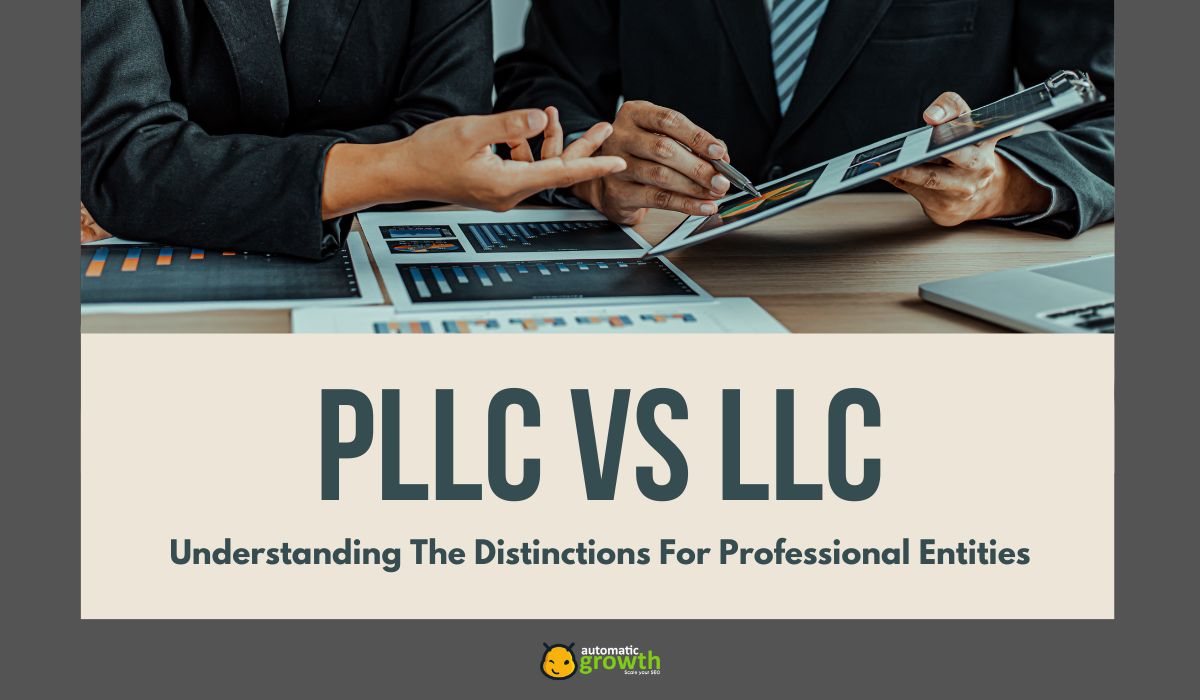If you're a licensed professional contemplating the best business structure for your venture, you're in the perfect spot to decide between an LLC or a PLLC. Whether you're starting a new business or considering restructuring an existing one, understanding these distinctions is crucial for operational efficiency.
Explore our PLLC vs. LLC detailed comparison on legal structures, tax implications, and suitability for various professions.
What Is PLLC?
Fast Facts
PLLCs often have restrictions on ownership, typically requiring all members to be licensed professionals.
A PLLC, or Professional Limited Liability Company, is a business structure designed for licensed professionals, such as doctors, lawyers, architects, and accountants. It offers liability protection similar to an LLC but is specifically for individuals who provide professional services.
In a PLLC, members are protected from personal liability for business debts or claims while also being held personally responsible for their own professional conduct. This structure ensures that while business liabilities are limited, professional accountability is maintained.
What Is LLC?
An LLC, or Limited Liability Company, is a flexible business structure that combines elements of a corporation and a partnership or sole proprietorship. It provides its owners, known as members, with personal liability protection against business debts and lawsuits. This means members are not personally responsible for the company's debts or legal troubles.
LLCs offer ease of administration with fewer record-keeping requirements and can have one or multiple members. They also provide flexibility in taxation, allowing businesses to choose how they want to be taxed, either as a corporation, partnership, or sole proprietorship.
PLLC vs LLC: Exploring the Key Differences
| Feature | LLC | PLLC |
| Definition | Limited Liability Company, a flexible business structure combining elements of corporations and partnerships. | Professional Limited Liability Company, designed for licensed professionals providing services. |
| Who Can Form | Any individual or group, not limited to licensed professionals. | Licensed professionals like doctors, lawyers, architects, and accountants. |
| Liability Protection | Provides personal liability protection against business debts and lawsuits. | Protects members from personal liability for business obligations, but not for their own professional malpractice. |
| Taxation Options | Flexible taxation; can be taxed as a corporation, partnership, or sole proprietorship. | Similar to LLC, with options for corporate, partnership, or sole proprietorship taxation. |
| Professional Conduct | Does not specifically account for professional conduct. | Members are personally responsible for their own professional conduct. |
| Ownership Restrictions | No restrictions on ownership; can include individuals, other LLCs, corporations, and foreign entities. | Must be owned by licensed professionals within the specific field of the PLLC. |
| Management Structure | Flexible management; can be member-managed or manager-managed. | Typically member-managed, but can vary depending on state laws and professional regulations. |
| Compliance Requirements | Varies by state; generally includes filing Articles of Organization, annual reports, and maintaining good standing. | Similar to LLC, but also requires adherence to professional licensing standards and may have additional state-specific requirements. |
PLLC vs LLC: Advantages and Disadvantages
| Advantages | Disadvantages | |
| PLLC | Designed for licensed professionalsPersonal liability protectionProfessional accountability maintainedTax flexibility | Ownership limited to licensed professionalsMay require additional state-specific compliancePersonal liability for professional malpractice |
| LLC | Flexible management structureSimple tax filing optionsPersonal liability protectionNo ownership restrictions | Limited professional accountabilitySelf-employment tax on profitsArticles of Organization and annual reports required in most states |
Fast Facts
If your business does not require a professional license, or if you prefer a more flexible structure, an LLC would likely be the more suitable option.
Choosing Between PLLC vs LLC: Which Is Suitable For You?
When considering the choice between PLLC and LLC, the decision largely depends on your professional status and business goals.
-
Assess Professional Licensing Requirements: If your profession requires a state license (e.g., doctors, lawyers, accountants), a PLLC may be required or more appropriate.
-
Consider Liability Protection Needs: Both PLLC and LLC offer liability protection, but a PLLC also considers professional malpractice. If personal professional liability is a concern, a PLLC might be preferable.
-
Evaluate Tax Implications: Understand the taxation differences. Both entities offer pass-through taxation, but there may be nuances in how state taxes apply to PLLCs and LLCs.
-
Ownership Restrictions: PLLCs often have restrictions on ownership, typically requiring all members to be licensed professionals. If your business includes non-licensed partners, an LLC might be more suitable.[1]
-
Analyze Management Structure: Consider how you want to manage your business. Both PLLC and LLC offer flexible management structures, but state regulations might influence this for PLLCs.
A PLLC is specifically tailored for licensed professionals such as doctors, lawyers, architects, and accountants. It provides liability protection for business debts while maintaining personal responsibility for professional conduct. This structure is ideal for the following:
-
Medical Practitioners (doctors, dentists, chiropractors)
-
Legal Professionals (lawyers, legal consultants)
-
Accountants (CPAs, tax advisors)
-
Architects
-
Engineers
-
Psychologists
-
Veterinarians
-
Physical Therapists
-
Pharmacists
-
Financial Advisors
On the other hand, an LLC is suitable for a broader range of business activities and is not limited to licensed professionals. It offers personal liability protection and flexibility in management and taxation, making it a popular choice for the following:
-
Retail Businesses
-
E-commerce Stores
-
Consultants (business, marketing, IT, education)
-
Freelancers (writers, designers, developers)
-
Real Estate Investors
-
Restaurant Owners
-
Construction Contractors
-
Gym/Fitness Centers
-
Event Planners
-
Photographers/Videographers
In summary, if you are a licensed professional seeking to start your practice, a PLLC might be the right choice. For most other business types, an LLC would provide the necessary legal framework and flexibility. Always consider your specific business needs and consult with a legal or business advisor to make the most informed decision.
Ready to kickstart your new business structure? Don’t miss out on the growth opportunities and exclusive resources for minority-owned business certification. Take the first step in elevating your business!
















